The benefits of cycling are myriad and profound:
- a stronger economy
- a healthier population
- more independent and self-confident kids
- a more resilient transportation system
But for Delaware to gain these benefits, a lot of Delawareans have to choose cycling. Today, however, not many do.
The League of American Bicyclists (LAB) performs a signal service to bicycling in America with its Bicycle Friendly America program. Though most of America is very bicycle-unfriendly, LAB highlights and promotes those places that are better than average. And, with it’s platinum designation, it particularly calls attention to those places that have, somehow, managed to make bicycling mainstream. It’s a very exclusive and elite club, however, consisting of only three communities:
- Portland, Oregon
- Boulder, Colorado
- Davis, California
How mainstream is bicycling in these places? In Portland, 6% of the commuting population use a bicycle as their main way of getting to and from work. In Boulder, this number – the “mode share ” – is 10%. And in the very amazing Davis, California, an incredible 25% of commuters – one quarter – get to and from work primarily by bicycle.
In Delaware, by way of sobering comparison, 0.3% of our commuters use a bicycle as their main way of getting to and from work.
Davis, Boulder and Portland are all places in the western United States. Davis and Boulder are both cities with large universities in their centers. But neither of these factors can account for their remarkable mode share. There are thousands of other communities in the western U.S. with bicycle mode shares no greater than Delaware’s, despite the “outdoor spirit” that supposedly permeates their culture. And while the presence of a university can certainly help, that too is no guarantee of high mode share, either.
So what does explain Davis, Boulder or Portland? It’s not rocket science. Each of these places has invested a huge amount of effort in creating a low-stress, family-friendly “bikeway” network. In Portland, it is a network of bicycle-friendly streets. In Davis and Boulder, it’s a network based on off-road pathways:
Davis, Boulder and Portland have all weathered the recession well and are all thriving. Their bikeway networks have all paid off for them, and will continue to do so. But it took them all a while to get these networks in place. While Portland only really got serious about 20 years ago, Davis has been working on its network since the 1960s.
 By joining with other citizen cyclists, you are supporting an organized, unified and powerful voice for bicycling. We have shown how powerful – how irresistible, in fact – we are when we are unified, organized and focused. If you want more of that – and want a low-stress, family-friendly bikeway network in Delaware – please help by becoming a member of Bike Delaware, today
By joining with other citizen cyclists, you are supporting an organized, unified and powerful voice for bicycling. We have shown how powerful – how irresistible, in fact – we are when we are unified, organized and focused. If you want more of that – and want a low-stress, family-friendly bikeway network in Delaware – please help by becoming a member of Bike Delaware, today
RELATED:
• Beyond Paint: Davis, California

